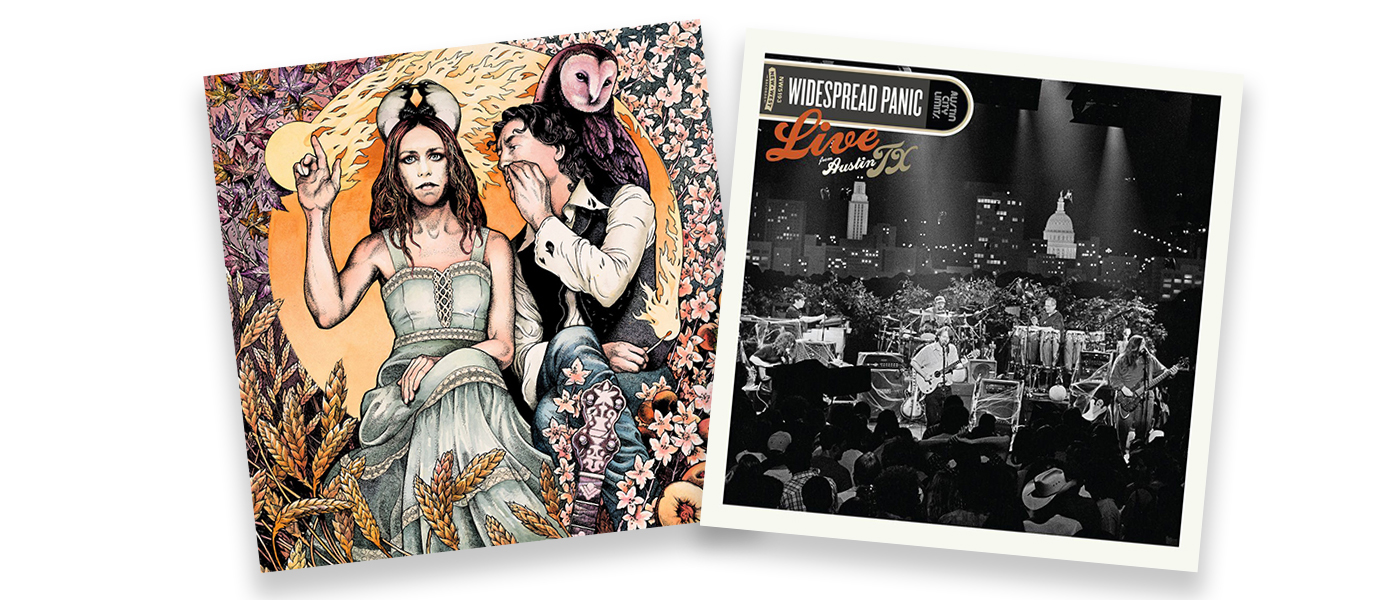I’ve also gotten my ears on a slew of half-assed standard new vinyl releases with poor pressings and basic sonic deficiencies. I’m almost scared to try anything new, at this point. So, what to do? Head back in time, I guess. To that end, I decided to play it safe and explore some of Mobile Fidelity’s titles that I’ve been salivating over, but simply hadn’t taken the time to buy. They also just put out a couple of records that I’ve been patiently awaiting, and we will start with a couple of those. First off: Aretha’s Gold.
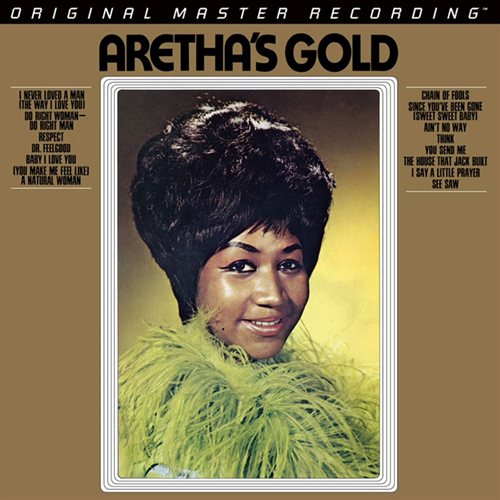
Aretha Franklin had been recording for around seven years on Columbia, but could never quite get over from there. Columbia’s team recognized the power of her cords, but they couldn’t seem to unleash it. The folks at Atlantic knew exactly how to do it, and they helped her to reveal the more soulful, Gospel-informed music that she had in her veins. Aretha’s Gold collects the best of that. And the best of Aretha’s Atlantic recordings is about as good as it gets. You know all the songs, and all the songs are here. “Do Right Woman,” “Chain of Fools,” “Respect,” “(You Make Me Feel Like) A Natural Woman,” “Think…” We could go on all day. And we could search for eternity, and I can’t imagine that we’ll ever do much better for audiophile Rhythm and Blues than what we have here. To me, the highlight is the clarity and detail in the background singers’ voices. You can hear so much life and so many nuances in the voices; the performances are elevated to a pedestal just shy of equal to Aretha’s own. Then, there’s The Queen. We don’t need to get into all that, right? Aretha’s at the head of the line for Top Vocalist, in my opinion. She, Little Richard, and Ray Charles are all right at the front trying to elbow each other out of position. (All three artists have been given the MoFi treatment at this point, and all the records are exemplary. Highly recommended.) Add Aretha’s vocals to that of her background singers, mix it all up with the ludicrous amount of talent available to record with under the Atlantic umbrella… then let Tom Dowd dial all the sounds in and you get what we have here: a truly audiophile presentation of some of the finest popular American music ever recorded. Spooner Oldham’s keyboard work sounds so toasty and so sweet that I can barely sit still long enough to take it all in. Can’t sit still for too long anyway as these two discs were cut at 45 rpm. I do not prefer the format, nor am I complaining about it. If I have to spend some extra time cleaning and flipping sides in order to experience this music in this way, then clean and flip I shall.
There’s nothing to not recommend about this set. If you’re a fan of Aretha’s, or classic Atlantic’s, or of Soul Music in general – this is your time. They only made 4,000. Don’t sleep on this one.
(This record was purchased joyfully from the good folks at MusicDirect.com.)
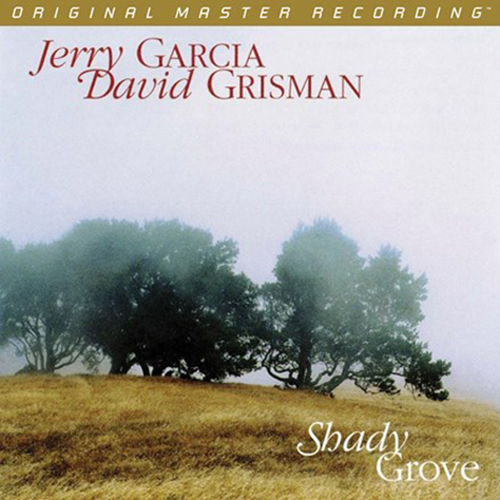
While we’re on the subject of new MoFi releases, we’d be remiss if we didn’t check out Shady Grove by Jerry Garcia and David Grisman. MoFi seems to keep their release dates close to their vest, and I’d been checking their site daily to see when this one would see the light. One day, it was simply available. It doesn’t quite live up to my lofty expectations, probably because they were too lofty. I’d just built it up too high in my mind. But it’s not MoFi’s fault. They did their part. If there is a problem, it’s with the performances & recordings themselves. And I know that Jerry Garcia fans are going to jump clear out of their patchwork clothes when they hear me say that. Here’s the thing: Garcia and Grisman released a record (called, appropriately, Garcia/Grisman) in 1991 that was formative for me.
Secrets Sponsor
MoFi released that one a while back too, and it’s absolutely one of my favorite records. Ever. Garcia was still with us when Garcia/Grisman was released, but had moved on by the time Shady Grove was put out in 1996. To my ears, it sounds like someone just put out about an hour’s worth of leftover Jerry Garcia performances that we’d simply have never heard had they not. And they might have been left over for a reason. The record’s just not as consistently great as Garcia/Grisman.
That could be for many reasons. The earlier record was recorded to be… a record. A cohesive group of songs recorded in a way that the artists’ fans would want to hear. Shady Grove was recorded over the span of a few years – the last few years of Garcia’s life. Many of the songs sound like they were intended for release. Some don’t. I love rough recordings. Hell, I’d much prefer to listen to Alan Lomax’s field recordings to much of what is heard on the radio today. But a few of the Shady Grove tunes just feel like afterthoughts. And they sound like Garcia hadn’t said a word in weeks before approaching the mic to sing cold.
The vulnerability in Garcia’s voice made him sound that much more honest, that much more real to us. But this feels different, and I can’t help but wonder if he’d have signed off on the release of at least a few of these songs. I don’t mean to make it sound like this record is a drag or like it’s outright poor. It’s neither of those things. I’m just not so caught up in the Legend of Jerry that I’m willing to give him a pass on material that doesn’t cut the mustard. I’ll hold on to this record, and I’ll pull it out and give it a listen sometimes. But I’ll likely have to fight the urge to just listen to Garcia/Grisman instead. Again, and again, and again.
If you’re a diehard Garcia fan, get this. It’s the first time it’s ever been released on vinyl. (The Garcia/Grisman record is still available too. Get that first.) Shady Grove has more liners, including a full-sized booklet that lives in the gatefold with a lot of cool history and anecdotes. If you’re gonna jump, jump now. They only made 3,000.
(This record was purchased at MusicDirect.com.)
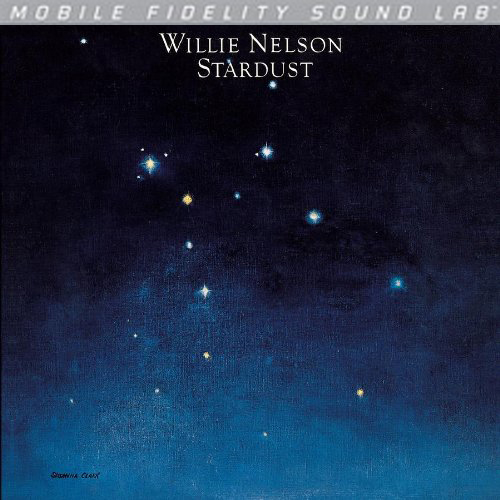
I’m not the biggest Willie fan in the world, but I like him a lot. I’ve picked up a few of his over the years, some better than others. So far, I have a decent copy of Teatro, a cool live thing from the Third Man Vault, an outright phenomenal take on Red Headed Stranger (by Impex), & an expendable Record Store Day release of some old demos (by whoever). I’ve had my eye on MoFi’s take on Stardust for a minute, and finally decided that now is the time. This is not one of their feted “Original Master Recordings,” this is a “Silver Label” affair. As I understand it, that means that the original tapes were not used for mastering (probably due to compromised condition or lack of availability), and that the record is pressed on standard weight vinyl as opposed to 180-gram action. The best available source is utilized and the discs are still pressed at RTI. That last bit is key because I’m losing faith in pressing plants, generally. I’m beyond curious about the quality of work being done at Third Man, but haven’t had occasion to hear a record pressed at their new facility. RTI is a known and glorious entity. Thank goodness for them.
Secrets Sponsor
I hesitated on Stardust for eons because… I was afraid of the strings. I’d been advised or I’d read somewhere that they were in abundance. As regular readers likely know by now, I don’t care for strings with my Country music. Or Rock n’ Roll music, but we’re talking about Stardust now. And that’s because it’s great. The strings are manageable, if not essential to the recording. Somehow, I’d lived more than four decades without learning that Stardust was produced by Booker T. Jones. Even better, his organ is all over this one. There’s Willie’s voice first, then Willie’s guitar, then Booker T’s organ. Everything after that sounds great, but is also just gravy. In case you missed it, Stardust is a collection of standards from the “American Songbook.” God help us, the American Songbook damn near ruined what remained of Rod Stewart, but it worked out for ol’ Willie just fine. I came for “Unchained Melody,” but I stayed for “Blue Skies.” I reckon I was vaguely familiar with the Irving Berlin chestnut, but Willie’s version slays me. I’m less enthralled with his take on “Unchained Melody.” There are more compelling ones out there. Anyway, most of the songs included in this collection are groovy enough. But it’s the sonic textures and the vibe that make the work fly. So much warmth and comfort in these grooves. Such pronounced clarity and detail. There are vast sonic spaces to explore while listening to this disc. So much separation between the instruments on such a wide and quiet soundstage that you could ballroom dance your way throughout the program. Get out your gowns & top hats.
If you’re a Willie fan, you already have this. If you’re looking for a point of entry, this would work just fine even if it’s not the most representative work of Willie’s storied career. The Silver Label discs retail for around $25 and are a bargain in comparison to most of what’s being foisted on a largely unsuspecting and ill-informed public today at similar price points. This one’s a winner.
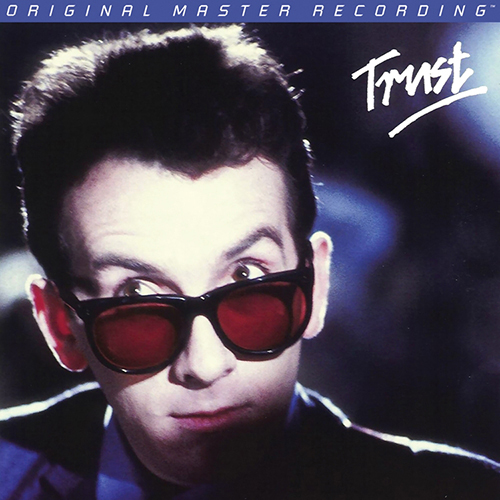
Speaking of artists that I like just fine, it’s been a minute since we checked in on the Elvis Costello reissues from MoFi. I picked up the first couple of titles in the series because I loved the material. I didn’t realize that the campaign would last for as long as it has. I was unfamiliar with Costello’s work past This Year’s Model, but I kept right on buying the MoFi reissues due to the sonic qualities on offer. In the process, I learned that I am, in fact, an Elvis Costello fan. I’ve since seen him perform live on a few occasions, and realized that the bloke is a deceptively great vocalist and guitarist. His songwriting talents are pretty nifty too. But everyone knows that. Anyway, I circled back for Trust this month. I’ve picked up seven of the MoFi reissues so far, and Trust is as fun as any of the rest. Let’s see…
Seems like Trust didn’t move the needle much when it was initially released in 1981, but is looked upon in retrospect through the proverbial rose-colored glasses. It’s really a fun listen, and I’m a little confused by how folks didn’t hear that way back when. Of course, the ‘80s were rough on everyone, and one must be gentle with one’s self and with others when revisiting the era. “Clubland” blasts the record off in a radio friendly way before giving way to “Lovers Walk,” which seems like more of a song sketch than a fully formed work. From there, Costello explores a variety of styles while never lingering long enough to take his shoes off. It gives the record a sort of variety show feel, except better. “Luxembourg” is a fun rave-up Rockabilly type of thing while “Different Finger” finds Costello mining some of the countrified territory that he settled into on Almost Blue. I’m not as wild about Nick Lowe’s production as I could be, but it works well enough for the material. He kind of sucked all the air out of the room and made everything feel a little too sharp for my taste, The drums are drier than beef jerky, but the carnival organ is lively enough. Everything is pretty close-up and a little claustrophobic, but so was the era, right? “New Lace Sleeves” gives the listener a little insight into the magic that Costello would reveal on Imperial Bedroom the following year. (Almost Blue came just before that, but you can probably get away with skipping that one, if you’re in a hurry. It’s my least favorite Costello title that I’ve encountered so far). “From A Whisper to a Scream” finds our person in a vocal duel with Glenn Tilbrook from the band Squeeze… and winning. His vocals are more powerful and better documented on the tapes, but the discrepancy is endearing and lends the song some Punk Rock credence while seeming more like a live performance than a studio take. If all of this sounds interesting to you, I’d advise grabbing a copy of Trust by MoFi while the getting is good. It’ll sneak up on you after a couple of listens, and make you want to take your other Costello records for a ride in the bargain. He’s deceptively great. Come on in.
(This record was rescued from the folks at MusicDirect.com.)
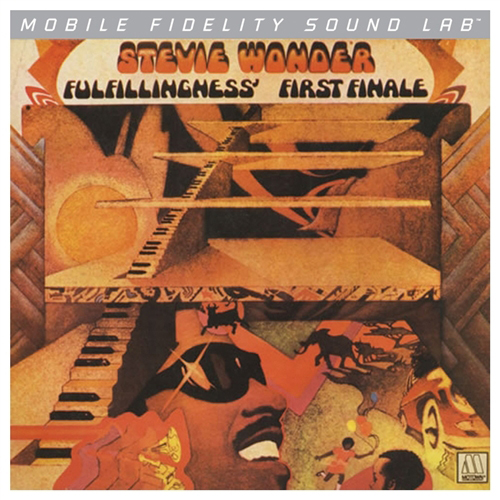
Alrighty. We’ll wrap the month up by taking MoFi’s reissue of Stevie Wonder’s Fulfillingness’ First Finale for a spin. It’s on the Silver Label imprint, which we described earlier. I thought that MoFi had given four of Stevie’s five “classic” records the Silver Label treatment, but they skipped Innervisions somehow. Which is weird. I knew that they hadn’t done Songs In The Key of Life, which is unfortunate because a MoFi version of that one might be the last record I’d ever need. It would involve a 7” in addition to the two full-length records and a full-sized book. Nothing that magical could transpire in 2017. But they did Music of My Mind and Talking Book along with Finale. Mercy. Wonder released his five showstoppers in less than five years. Soul music has never been the same. I mean it.
Apparently, this party started when Wonder collaborated with the members of, get this, Tonto’s Expanding Head Band. He heard the duo’s first record, Zero Time, and hired them right away. They were designers and purveyors of the Moog sound, and there’s lots of tasty info on the whole meeting in that Soundbreaking documentary series that PBS did last year. Seems like they met Wonder at a recording studio and barely saw the light of day while churning out those five masterpieces that we alluded to earlier. Except that, I don’t know that Fulfillingness’ First Finale measures up to the other titles in that run. It’s great, certainly. It has “Boogie On Reggae Woman” to recommend it, for crying out loud. “They Won’t Go When I Go” is a blast, but of a different variety than most of Stevie’s classic fare. It’s sparse and esoteric. Like a Soul version of a Brian Wilson ballad that he might have tagged onto Pet Sounds or something. The Jackson 5 pops in to do some singing on “You Haven’t Done Nothin’.” The entire record is a quick study and a stone groove. It won Record of the Year at the Grammys, for people who care about that type of thing. But I can’t divorce it from Wonder’s work that immediately preceded and followed it, and I’ve not gotten nearly as much mileage out of it as I have the others. Especially Talking Book. And Songs in the Key of Life. If I were going to recommend only two Stevie records, those would be them. Hopefully, a label of repute will take Songs and Innervisions on soon enough. I suspect that the masters for both burnt up in that God forsaken Universal Music warehouse fire in 2008, which might be why these MoFi titles are on the Silver Label in the first place. Regardless, things won’t ever be this good for Stevie fans that prefer vinyl. If you haven’t already, you could dig around for the other MoFi titles (which I believe are already out of print) and supplement with Speakers Corner’s reissue of Songs in the Key of Life, and be pretty well set. I don’t know what to suggest for finding a decent copy of Innervisions because I’ve never been too wild about the quality of Motown’s original releases. Especially from the ‘70s. If you see one, let me know. In the meantime, I recommend Stevie’s Silver Label titles. Highly.
(This record was purchased with cause from the folks at MusicDirect.com.)


